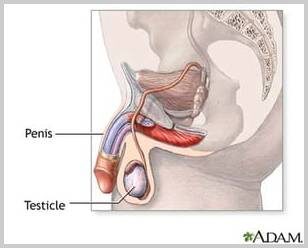
Orchitis
Orchitis is inflammation that occurs in one or both of the testicles. It can be caused by an inflammatory response or an infection of either bacteria or viruses. Orchitis generally causes a sudden onset of pain and/or swelling in either one or both testicles that may spread down into the groin area. Orchitis may be related to a mumps infection, urinary tract infections, sexually transmitted diseases or idiopathic (unknown cause). Pain or swelling in the testicles should prompt an evaluation by your health care provider to determine the cause.
Symptoms of Orchitis
Orchitis may present as a wide range of symptoms. Symptoms of orchitis may include the following:
● Nausea, vomiting
● Fever
● Swelling, sometimes significant, in one or both testicles
● Painful urination
● Bloody ejaculate (hematospermia)
● Penile discharge
● Pain during intercourse
Patients experiencing testicular pain should consult with their doctors, as such pain can be an indication of a variety of conditions.
Diagnosing Orchitis
Orchitis is diagnosed through a history and thorough physical exam, including an examination of the testicles. To rule out other conditions, the provider may also conduct the following tests:
● STD screenings
● Urine tests
● Ultrasound imaging
● Prostate and rectal exam
● Other blood tests as appropriate
Treatment of Orchitis
Treatment for orchitis will vary depending on the cause. Treatments may include conservative treatment such as rest, icing, support. Treatment may also include medications such as antibiotics. In severe cases may require surgical intervention.
Mumps Treatment
Orchitis secondary to mumps can usually be managed with analgesics, ice, elevation, rest and time. The swelling will improve as the mumps infection clears but may take up to several months.
Sexually Transmitted Disease Treatment
Orchitis caused by sexually transmitted diseases requires antibiotic treatment for both the affected patient and any sexual contacts. It is important to take the entire course of antibiotics, even after symptoms are gone. It is also important to be honest with and notify any sexual partners so they can receive proper treatment.
If left untreated, orchitis can cause long term complications ranging from testicular pain,atrophy shrinking), loss of fertility. As with any medical condition, prompt medical care is important for helping to prevent any long term complications.
Prevention of Orchitis
Practicing safe sexual habits such as maintaining monogamous relationships and condom use can prevent sexually transmitted disease related orchitis. Mumps vaccinations can help to prevent mumps-induced orchitis. Preventing urinary tract infections can reduce risk of orchitis related to UTIs.
